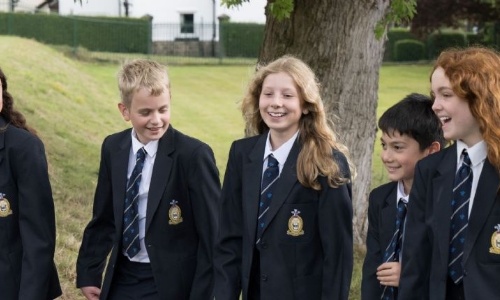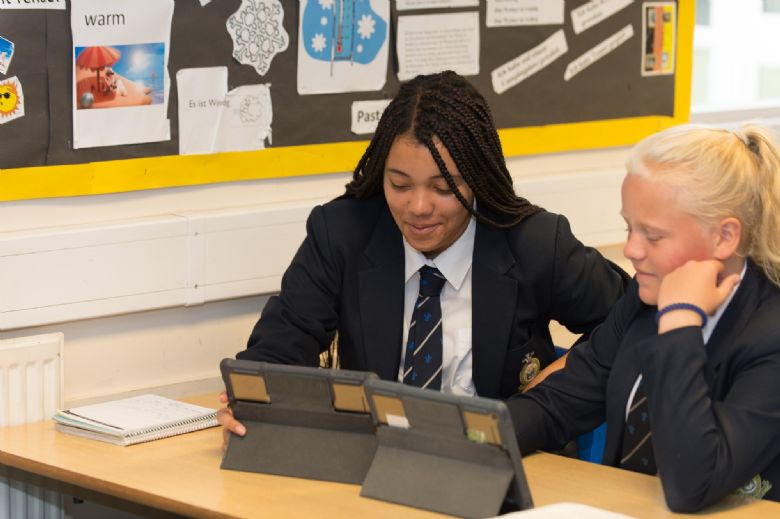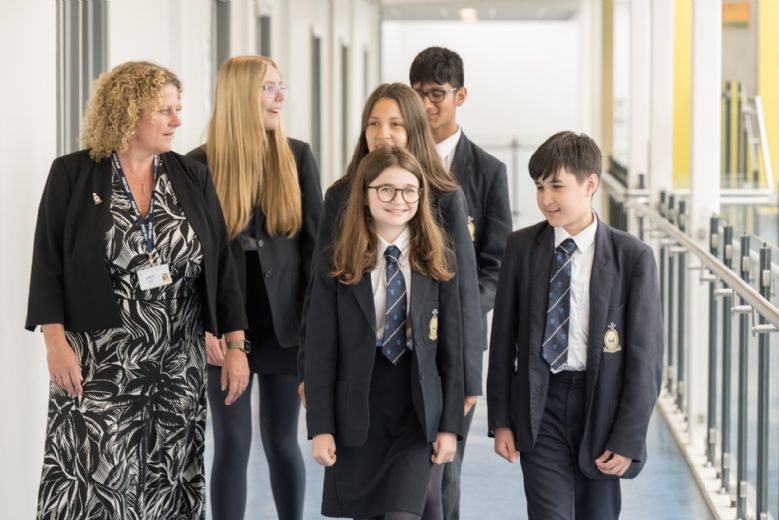A response to the recent parent/ carer survey around behaviour

Last month we asked parents and carers to share their understanding and experience of our behaviour system, known in school as Positive Discipline (PD). The responses to this survey were reassuring, enlightening and at times thought-provoking to read. All the feedback was useful, and this will be considered as we move forward with PD over the next year.
What was clear (and pleasing) was the large-scale support for the system. Comments such as "PD is one of the main reasons for choosing this school, I believe all students need to have strong consistent rules so they have a clear understanding of what is expected of them.” and “The stamps and comments system has worked well for my two children.” were lovely to hear. As was the view that the bulk of parents (68%) feel that we 'get the approach right'. However, highlighting the fact that you can never please everyone, it was interesting to note that some parents felt we were 'too strict' and a smaller number felt we were 'too lenient'!
A popular comment was around the topic of consistency. This was not a surprise. Our system is built on trying to be consistent so that all students have a similar experience whatever lesson they attend and whoever the member of staff in front of them is. We work hard to maintain this, but accept there are times (thankfully few in number) when this consistency can slip. We believe that this is rare but we are working to improve this area by frequently revisiting aspects of the system in training sessions with staff. Will this ever be perfect? Probably not, but we are aiming to get as close to it as possible.
 Let me exemplify why consistency is so difficult. I suspect that most of our parents/ carers reading this have at some point agreed to a specific rule with a child eg: a time to be home by. Your child may agree to this time, all is calm. But then that child comes home 20 minutes late - what do you do? It may be that one partner insists on holding the line. The child is late, has not met the expectations and so is grounded. The other parent may be of the view 'it's only 20 minutes, they are a good child and don't do it often, leave it be'. Here is a small-scale example of an inconsistency between how two adults are parenting their child. Now, in a school, consider multiplying this upwards, to 1600 students and over 200 staff. Many of those staff having over 150 student interactions in the course of a day. If two people can struggle to agree a consistent approach, I think it is understandable that at some points staff may unintentionally be inconsistent within the day. This is not to excuse it, merely to exemplify how, with so many human interactions on a daily basis, it can be difficult to get consistency every time with every interaction!
Let me exemplify why consistency is so difficult. I suspect that most of our parents/ carers reading this have at some point agreed to a specific rule with a child eg: a time to be home by. Your child may agree to this time, all is calm. But then that child comes home 20 minutes late - what do you do? It may be that one partner insists on holding the line. The child is late, has not met the expectations and so is grounded. The other parent may be of the view 'it's only 20 minutes, they are a good child and don't do it often, leave it be'. Here is a small-scale example of an inconsistency between how two adults are parenting their child. Now, in a school, consider multiplying this upwards, to 1600 students and over 200 staff. Many of those staff having over 150 student interactions in the course of a day. If two people can struggle to agree a consistent approach, I think it is understandable that at some points staff may unintentionally be inconsistent within the day. This is not to excuse it, merely to exemplify how, with so many human interactions on a daily basis, it can be difficult to get consistency every time with every interaction!
83% of respondents agreed that staff have high expectations of their child. The majority of parents/ carers identified that their child felt safe in our school, a view that matches our own half termly student surveys and is something that we are proud of. There was overwhelming support for our stance on mobile phones (90% felt it was a positive thing that students did not access them during the school day) and comments acknowledged the changes we have implemented with PD this year as "steps in the right direction".
What also came through was a message that although the system was clear, some of the understanding about how it is put across to students and reasons for certain rules/ sanctions were less clear. This was enlightening and has only been identified through information gathered from you in this survey. We will review the explanations of aspects of PD over the next year but, in the interim, below are some of the common areas that were queried, with an explanation of how the school sees them and why we ask for your support in instilling these standards.
 A handful of responses questioned how the approach was positive and felt it was at times like something being 'done to' rather than 'with' the students. This is an interesting take, but neglects to consider the basic premise of the system in classrooms which is that students always have a choice. When issued with a verbal warning, a student can choose to correct their behaviour and receive no further sanction. If they choose not to, they know they move to a written comment. Again, at this point, the student has the ability to correct their behaviour. At two written comments in a lesson no further sanction follows. There was even some suggestion that getting to this stage gives students too much choice to make mistakes! Ultimately, throughout the above the students are empowered to make the right decisions - something that the majority do regularly - in fact in each year group, over 90% of students have an average of less than one comment a week for this year!
A handful of responses questioned how the approach was positive and felt it was at times like something being 'done to' rather than 'with' the students. This is an interesting take, but neglects to consider the basic premise of the system in classrooms which is that students always have a choice. When issued with a verbal warning, a student can choose to correct their behaviour and receive no further sanction. If they choose not to, they know they move to a written comment. Again, at this point, the student has the ability to correct their behaviour. At two written comments in a lesson no further sanction follows. There was even some suggestion that getting to this stage gives students too much choice to make mistakes! Ultimately, throughout the above the students are empowered to make the right decisions - something that the majority do regularly - in fact in each year group, over 90% of students have an average of less than one comment a week for this year!
Which leads to a point raised about rewards, and from some the frustration of their child not getting them often enough. The main 'instant' reward is the teacher stamp - over 250000 of them have been awarded so far this year! Beyond this there are many other types of rewards that students can receive (postcards, SLT praise, treats and reward trips for example) each with a different value to the student who receives them. So far this year we have introduced positive points via Arbor and praise emails as additional ways to support those getting it right. We are keen to do more to reward the vast majority of students who do the right thing, but in a world of tightening budgets it is not so easy to find tangible awards that students covet. We have some ideas that we hope to explore and trial over the next 18 months - watch this space!
At the opposite end from rewards and stamps was comments and a perceived view that these were sometimes given for petty things. This may be in part due to the limited space in the planner which can lead to a quite 'blunt' teacher comment such as 'wrong way down corridor' or 'on corridor at lunch'. Many of the rules we have in place cover the school site and are there to enable a positive and safe learning environment - one-way systems for example are in place to enable over 1600 students to move safely around some particularly narrow parts of school. The advent of split lunches since Covid allows all students to be served and have space, but also means that many classrooms are still used for lessons during lunch time. For this reason disturbance (for example by walking along corridors at lunch time) cannot be tolerated. All of these expectations are things that are regularly revisited by staff with students and students know that where they get this wrong a comment is issued.
However, some suggested verbal warnings would be more appropriate. The issue with this is that we keep no record of verbal warnings, particularly around school. This means that there is little deterrent to students - they could simply choose to break a rule (however minor it may appear) and receive multiple verbal warnings from multiple staff, never reflecting on or correcting the behaviour. If they know there is no next stage up the sanctions system students will continue to break that rule (disturbing lessons as they walk down a corridor in their lunchtime for example). At Prince Henry's students know if they get three around school comments they will receive a detention. The comment given therefore in isolation seems petty, but as part of the bigger picture acts as a deterrent to repeating that behaviour.
 The final area to pick out was uniform. The benefits of uniforms in schools are many, the DfE via their Education Hub note that uniforms "provide a sense of belonging", "foster a good learning environment", "help promote the school ethos" and "reduce peer pressure at school". We have high expectations of our students, this starts with their appearance, which is why we expect students to wear their uniform with pride and why we sanction when our expectations are not met for example when skirt lengths are too short, coats are worn in the building or jewellery can be seen.
The final area to pick out was uniform. The benefits of uniforms in schools are many, the DfE via their Education Hub note that uniforms "provide a sense of belonging", "foster a good learning environment", "help promote the school ethos" and "reduce peer pressure at school". We have high expectations of our students, this starts with their appearance, which is why we expect students to wear their uniform with pride and why we sanction when our expectations are not met for example when skirt lengths are too short, coats are worn in the building or jewellery can be seen.
A range of other areas were mentioned, with often near equal numbers of people saying we get it right as saying we get it wrong! All the feedback has been taken on board and will be considered as we seek to firm up the system, ensuring that we emphasise the positives of Positive Discipline.
We know there are many things right with the PD system at Prince Henry's, but also that there are a few areas we know we can improve further. We are just over a year into a refreshed leadership team at the school. One thing you can be sure of is that team has a strong desire to work with students, parents/ carers and staff to ensure that our behaviour system is robust and supportive enabling all students to show respect, flourish and achieve.
